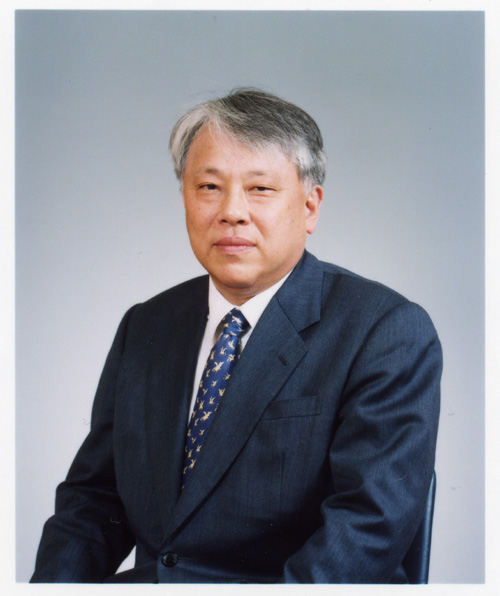

|
INTRODUCTION |
|
On April 1st, 2004, eighteen Inter-University Research Institutes, to which the National Institute for Basic Biology belongs, were realigned to 4 new organizations. Our National Institute for Basic Biology (NIBB) became a member of the National Institutes of Natural Sciences that consists of five National Institutes, National Astronomical Observatory, National Institute for Fusion Science, National Institute for Physiological Sciences, Institute for Molecular Science, and our-selves (NIBB). Each Institute managed by the Director-General, who is assisted by the Advisory Committee in each Institute, is independent from each other. Therefore, the NINS is a United Research Institutes of Natural Sciences. A selection of the Director-General is performed through the recommendation from the Advisory Committee to the Director-General Selection Committee. Then the Director- General is appointed by the president with an approval of the Management Council and Education and Research Council. The NIBB established in 1977. The aim of the NIBB is the promotion and stimulation of studies in the field of Biology. As a center of excellence (COE), NIBB promotes not only basic biology but also the modern biological sciences by conducting first-rate research on site as well as in cooperation with national, public and private universities and research organizations. Researchers at the NIBB investigate Cell Biology, Developmental Biology, Neurobiology, Evolutionary Biology and Biodiversity, Environmental Biology and Theoretical Biology to elucidate the general and fundamental mechanisms underlying various biological phenomena. In 2004 after the establishment of NINS, NIBB changed the research unit system from 3 departments to 30 independent divisions and laboratories. The purpose of this change is to make researchers move easily to the new field if necessary. On the higher education, NIBB became a member of the Graduate University for Advanced Studies when it was established in 1988, as a department of Molecular Mechanics in School of Life Science. Three students for five year Doctoral course and six for three year senior Doctoral course are open to applicants for entrance. On March 31st, 2004, adjunct professors Dr. MIYATA Takashi, Dr. YANAGIDA Mitsuhiro, and Dr. NAKAMURA Haruki left NIBB just after the completion of their appointments. Research associates Dr. ISHIHARA Satoru, Dr. YAMAMOTO Hiroshi, Dr. MIZUSHIMA Noboru and Dr. KOBAYASHI Tohru were promoted to chief investigators of the Research Institutes and on December 31st, 2004, Dr. SUZUKI Iwane to Tsukuba University as an assistant professor. In congratulation, associate professor Dr. WATANABE Masakatsu left NIBB on August 31st as he was promoted to a professor of the Graduate University for Advanced Studies. Conversely five researchers were newly appointed in 2004, Dr. TANAKA Minoru from Hokkaido University as an associate professor, Dr. TSUKAMURA Hiroko from Nagoya University as an adjunct associate professor, Dr. YAMAUCHI Daisuke from Himeji Institute of Technology as an adjunct associate professor, Dr. IMAMURA Takuya from Institut Jacques Monod (JSPS Post-Doctoral fellow for abroad) as a research associate and Dr. SHIGENOBU Shuji from JSPS Post-Doctoral fellow as a research associate. In addition, a number of postdoctoral fellows, technical assistants, secretaries, and graduate students after awarded Ph.D. degree left, and conversely people newly joined NIBB at the equivalent positions. In consequence, the total number of personnel working at NIBB has been kept at approximately 300 for several years. As a COE of the biological research institute, NIBB is responsible for conducting research projects in cooperation with various research groups. Moreover, NIBB continues to sponsor interdisciplinary symposia and study meetings on current topics by inviting leading scientists from around the world to the NIBB. Based on this concept, NIBB started to support a series of Okazaki Biology Conference (OBC) through intimate cooperation with a variety of biological scientific societies. The first OBC was held on January 25-30, 2004, entitled “The Biology of Extinction” and the second on September 26-30, entitled “Terra Microbiology.” Both meetings were very successful. Thirty to forty scientists from abroad and equivalent number of them from Japan had an exciting discussion on the new field of future biology. NIBB also provides a training course in biological sciences for young investigators. Finally, I would like to celebrate the retirement of Mr. HATTORI Hiroyuki with appreciation of his dedicated work as the Head Technical Staff. Toward his respectful contribution, the NIBB awarded him a title for NIBB Technical Staff Emeritus on March 31st, 2004. We always welcome any suggestions concerning the research activities of NIBB. KATSUKI, Motoya, D.Sc. |

|

|
 |